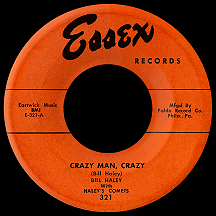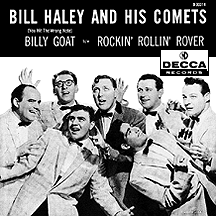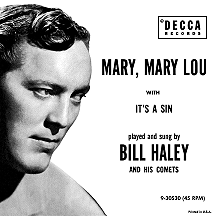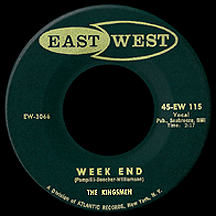BILL HALEY
AND HIS COMETS
The story of Bill Haley is one of music history's most significant. Each event of his early life was a stepping stone in the formation of rock and roll. Born in 1925 in Highland Park, Michigan and raised in the tiny town of Boothwyn, Pennsylvania (some 20 miles from Philadelphia), Bill was a reserved and self-conscious child due to the blindness in his left eye, the result of a routine but poorly-handled operation by a country doctor when he was in an infant. He never mention his "bad eye" to people, but to many it was obvious (as an adult, he was careful to be photographed showing his "good side" whenever possible). During his teenage years, there was a marketplace down the road from where he lived called the Auction Mart. He began playing instrumental guitar numbers for the patrons and response was positive, so the owner started paying him a dollar per night to perform.
Within a few years he was playing at amusement parks in Pennsylvania, Delaware and New Jersey (all within perhaps a 50 mile radius) and by 1945 he'd picked guitar with a few of the country and western bands in that area. He played on-air at Fort Wayne, Indiana station WOWO with C&W group The Down Homers, then later joined them when lead singer and yodeling specialist Kenny Roberts left to begin a solo career; they had relocated to Hartford, Connecticut in '46 and he was with the band for about eight months. Haley purposely avoided stepping up to the microphone during that early phase of his career, his childhood shyness still in play as an adult, though that didn't stop him from approaching women; he met a nice young lady named Dorothy Crowe and married her in December 1946.
Jack Howard formed Cowboy Records in Philadelphia the same year. Haley started his own band, Bill Haley and the 4 Aces of Western Swing, in 1948, and made his first records for the label soon afterward. "Too Many Parties and Too Many Pals" was the first release, featuring lead vocalist Tex King. The second, in early '49, was "Tennessee Border" (a hit for several artists that year including Red Foley), this one featuring vocals by Barney Barnard; the flip side, George Morgan's "Candy Kisses," revealed Haley's controlled singing voice, filled with potential for the future. He also possessed formidable yodeling skills (acquired back in his days at the Auction Mart) not unlike Roberts of the Down Homers before him; occasionally he was billed at shows as Yodeling Bill Haley. Most of the recordings for Howard's record label were done in the studios of WPWA in Chester, Pennsylvania, which served the Philadelphia area.
Reno Browne and her Buckaroos were a Cowboy Records recording act in the late '40s; Browne (born Josephine Clark, nicknaming herself after her home town of Reno, Nevada) starred in more than a dozen B movie westerns between 1946 and 1950 and was married for a short while to bullwhip-wielding western star Lash LaRue. Bill Haley was the featured vocalist on her single "My Sweet Little Girl From Nevada" in 1950. It was around this time that Haley changed the name of his group to The Saddle Men and made records for Ed Wilson's Keystone label, including "Deal Me a Hand" and "Susan Van Dusan," both featuring credited steel guitarist Billy Williamson. There was even a 78 released on Atlantic Records (which mostly focused on R&B and jazz), the honky-tonkish piano tune "I'm Gonna Dry Ev'ry Tear With a Kiss."
Bill was so confident he would be a major star that he offered the members of The Saddlemen (the name adjusted slightly after the first few records) a full share of the profits in any future success the band was certain to have...and he put it in writing. He began to back away from performing in a strict country style, leaning instead towards pop music, feeling this was a better way to break into the big time. Besides, it would help get him out of the cowboy bars and dives and into bigger auditoriums and concert halls. With the hair on his forehead naturally coming down in a "kiss curl," which became his trademark look, he had seemingly gotten over that childhood shyness, having developed an image and all the talent and drive required to become a household name.
Working on the air at WPWA to compensate for the ups and downs of his music career, he and Jack Howard felt they needed a new slant on the old routine to take Bill and the band to the next level. Dave Miller heard something in Bill's voice that seemingly no one else had noticed; claiming to be the owner of Essex, a new record label, he pitched an idea: Haley and the Saddlemen would do a version of "Rocket '88'," a recent number one R&B hit for Jackie Brenston and his Delta Cats. He insisted there should be no photographs so that people wouldn't be able to tell if he was black or white, thus giving him a shot at reaching a larger audience. With some hesitation, Haley and Howard took him up on it. The song began with sound effects of a honking horn and screeching brakes as the band launched into a rhythmic beat and forceful vocal approach nowhere close to anything they'd done to that point. A little underwhelming when compared to the wild Brenston original, it was nonetheless a bold departure for a reformed hillbilly singer (an approach that was to make Elvis Presley a star a few years later). Turns out Essex Records didn't actually exist - yet - and the record wound up being released on the Holiday label. Venturing into this arena made Haley nervous; his plan was to go in the direction of pop music, not R&B. Follow-up singles were more subdued.
Miller's Essex label did appear afterwards and Haley signed on with the new company. The first Essex single, in early '52, was "Icy Heart," inspired by the title of the Hank Williams smash "Cold, Cold Heart." "Rock the Joint" (an R&B hit in 1949 for Jimmy Preston written by Harry Crafton, Wendell Keane and Doc Bagby) was a song the group had been doing at their shows; they recorded a version for the B side with no intention of promoting it. The finished take had bassist Marshall Lytle using the "slapback" technique, with a microphone placed close to the upright bass to make it more pronounced on the recording, a trick that came to be widely used by most early rock and roll and rockabilly bands, a passel of trailblazers yet to come. This innovation fed fuel to Haley's later claim that he was "The Inventor of Rock and Roll."
The single's A side was overshadowed by "Rock the Joint," popular in the Philly area, but Bill and the Saddlemen met with a great deal of resistance when they performed the song live at various venues; their clothes and overall look suggested country and western, but the sound was rhythm and blues. Haley faced rejection from his adult audience...but there existed another, largely untapped, demographic in the early 1950s...teenagers! The direction he needed to take in order to achieve his longed-for stardom was becoming clearer. An artist's struggles are not without their pitfalls, though. His obsessive focus on career took its toll on his marriage to Dorothy and they were divorced in November 1952. Within days he found her replacement, Barbara Joan Cupchack (nicknamed "Cuppy"), a "blonde bombshell" who became wife number two before the end of the month.
"Rocking Chair on the Moon" was the next single and the last under the countrified Saddlemen name. "Haley's Comets" was suggested (a play on Halley's Comet; noted by astronomers for centuries, it appears about every 75 years and had most recently been spotted in 1910) and Bill felt it would further distance them from the C&W image. The next single was credited to Bill Haley with Haley's Comets. "Crazy Man, Crazy" came out of the hottest session yet and was the song that broke them nationwide with the young crowd, going top 20 in the spring of 1953. The guys immediately ditched the cowboy outfits and began appearing in tuxedos, a "hipper" option at the time. Bill bought a Cadillac (who didn't in those days?) and began to enjoy the bigtime, as he was sure he'd hit it!
Follow-up singles "Fractured" and "Live It Up!" were strong efforts but disappointing sellers. Haley began to play around with the word "rock" in song titles; one composition, "Rock-A-Beatin' Boogie," was recorded in 1954 by pop vocal group The Esquire Boys for Guyden Records and energetic R&B instigators The Treniers for the Okeh label (Haley's own version of the song came to life the following year). By the time they left Essex in 1954, the band had streamlined its name to Bill Haley and his Comets. The loss of a potential multi-million dollar act didn't slow Jack Howard's momentum; he created the concept of 101 Strings (instrumental cover versions of established "easy listening" songs and a close cousin to Muzak, both falling under the heading of "Elevator Music") and made millions spreading the strings far and wide with a successful series of albums from 1957 until the early 1980s.
Milt Gabler was the first person in the employ of the U.S. Branch of Britain's Decca Records to understand what what going on with rock and roll in the early '50s...the heads of the label simply couldn't care less. Still, he had the power to sign new acts and, realizing the new trend was starting to break big, he wanted the company to be in on it. Because Decca was a major label, the money offered to Haley on the strength of "Crazy Man, Crazy" was far beyond anything he'd imagined thus far. He didn't hesitate to take the offer. He and the Comets were in position to advance to the next level.
Jim Myers (using the pseudonym Jimmy De Knight) and Max C. Freedman had written their own "rock" song, "(We're Gonna) Rock Around the Clock," first recorded in 1954 by Sonny Dae for the Arcade label, though Haley has claimed he and the Comets had performed the song as early as 1953. It was recorded at the band's first session for Decca in April 1954, along with the Dickie Thompson song "Thirteen Women," a bizarre atomic-era fantasy about being the only man to survive the apocalypse, having his pick of a baker's dozen female survivors. The session took place at Decca's Pythian Temple studio in New York, a former ballroom with vaulted ceilings that had been converted into one big, round recording studio. The shape and size of the Pythian gave off a natural reverb and recordings made there had a bright, clean ambience that simply jumped off the grooves of the records. Other acts of the time acheived great results in the unique studio, including Sammy Davis Jr., Al Hibbler and, a few years later, The Johnny Burnette Trio.
First released in the spring of '54, "Rock Around the Clock" achieved marginal airplay and sales, a considerable disappointment after the success of "Crazy Man, Crazy." But it wasn't a total bomb and Decca held out hope for coming releases. Haley wasn't happy about the next single, "A.B.C. Boogie," feeling it was no more than a sub-juvenile tune for small children. Flip "Shake, Rattle and Roll," on the other hand, was right up his alley; hesitant about doing "Rocket '88'" back in '51, he had grown comfortable with rhythm music and was game to put his stamp on some of the genre's best offerings. Joe Turner's sensational recording of the song, written by Jesse Stone (as Charles Calhoun) was already a major R&B hit when Bill and the Comets laid down their cover, cleaning up some of the more suggestive lyrics (for example, 'Well you're wearin' those dresses, sun comes shinin' through' was changed to 'Wearin' those dresses, your hair done up so nice'). The lyrical adjustments didn't hurt; it hit the charts in July '54 and became the band's first top ten hit in November.
Haley was on a rock roll..."Dim, Dim the Lights (I Want Some Atmosphere)" (conjured by the creative minds of Beverly Ross and Julius Dixon) lit up late '54, followed by the two-sider "Mambo Rock" and "Birth of the Boogie" (the latter penned by Haley with longtime collaborators Billy Williamson and pianist Johnny Grande). Meanwhile, Jim Myers had a separate agenda: convinced his own "Rock Around the Clock" deserved more than the mere shrug it received from radio and record buyers the previous year, he began working on his own promotion plan. He had connections, apparently more than anyone at Decca Records realized, and he managed to get the producers of Blackboard Jungle to feature Haley's recording over the opening credits of the film, which was released to theaters in March 1955. The move was unprecedented; it was the first rock and roll song to be used as the theme of a major movie.
Blackboard Jungle, starring Glenn Ford as a teacher at an inner-city school and 27-year-old Sidney Poitier as one of his teenage students, was an outstanding film, though a bit exaggerated in its depiction of teens as hoodlums, rebelling against parents and teachers while indulging the evil influence of rock and roll as their music of choice. Despite such a negative connotation, it was one of the year's top box office hits, prompting Decca to give "Rock Around the Clock" another chance. It exploded on the second try, hitting the top ten in May, then climbing to number one in early July and staying on top through mid-September. The record sold millions of copies in a short period of time and Haley thereafter referred to it as "the tune of rock and roll." He was right. It was, and still is.
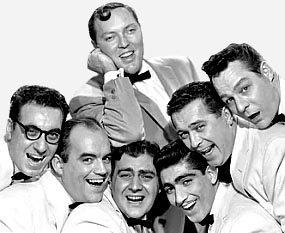
Bill Haley and his Comets had become major stars. Haley moved to the Jersey shore and lived it up. He bought five Cadillacs, one for each member of the Comets...and treated himself by buying a yacht, which of course he named "The Comet." For some of the group's members, it wasn't enough. Billy Williamson and Johnny Grande had been with the band at the time Haley generously granted a share of all profits, as had guitarist Danny Cedrone (who died of a heart attack in July 1954, not long after the recording of "Rock Around the Clock"). But saxophonist Joey D'Ambrose, bassist Marshall Lytle and drummer Dick Richards had come later and were being paid considerably less for their contributions. No doubt feeling bilked, swindled and/or bamboozled, they quit the band in September '55, formed The Jodimars, quickly scored a contract with Capitol Records, and unfortunately had no success.
Al Rex, formerly with the 4 Aces of Swing, rejoined as bassist. Guitarist Frank Beecher, a jazz musician, had been doing sessions with the band since they had come to Decca and Haley hired him permanently. Ralph Jones joined as drummer and his close friend Rudy Pompilli came in to play sax. Pompilli was the most important addition to the Comets, a key player in the band's future success. A Chester, Pennsylvania native, he was obsessed with the saxophone during his youth. By 1953 he was playing with Ralph Marterie's orchestra and was voted Best New Saxophonist in Down Beat magazine's 1953 poll. He had met Haley a few years earlier during an on-air performance at WPWA.
1955 wrapped up with two more big hits, "Razzle-Dazzle" and Winfield Scott's "Burn That Candle," covering a version by R&B group The Cues. The band's profile was raised even higher in 1956 with the top ten hit "See You Later, Alligator," written by Robert Guidry, another signature song for the band; the title became part of the slang of '50s teens and is a catchphrase that's been used by just about everyone at one time or another.
The group took advantage of its association with rock and roll and popularity with America's youth. They were the stars of Rock Around the Clock, which arrived in theaters exactly one year after the breakthrough Blackboard Jungle. The film, short on acting talent but long on musical expertise, also starred Alan Freed and featured The Platters. It was loaded with Haley performances including then-current single "R-O-C-K," established hits "Mambo Rock," "Razzle-Dazzle," "Alligator" and several others. Rudy Pompilli's workout on the hot sax instrumental "Rudy's Rock" was a highlight of the film and a hit in the fall. Don't Knock the Rock found them back on the silver screen at the end of the year. Both movies made mounds of money for everyone involved. Later, Bill and the Comets appeared in a German film, 1959's Here I Am, Here I Stay, performing "Vive Le Rock and Roll" with European diva Caterina Valente.
Amongst all this merriment, some members of the "older generation" were busy mounting publicity against rock and roll and Haley and his Comets were at the forefront of offenders for a time, at least until focus shifted to the far more shocking Elvis Presley. The hits continued, though at a slower pace through 1957; as the decade waned, the group's music (the more gimmicky tracks like "(You Hit the Wrong Note) Billy Goat," "Skinny Minnie" and "Lean Jean," at least) somehow became more acceptable to that older demographic. The entire group (except for Haley) embarked on a side project as The Kingsmen with an instrumental record called "Week End," a hot sax-and-guitar romp on the East West label that hit the charts for a few weeks in September 1958.
The Comets were constantly touring and Bill held them to a semi-strict regimen concerning conduct and professional attitude on the road. It didn't stop the guys from doing some drinking and consorting with women, but they kept things reasonably under control and success was extended beyond the impressive record sales to successful concert tours in the U.S. and overseas. The band, a tight outfit to begin with, became increasingly more polished with performances getting hotter and louder; a highlight of stage shows was Pompilli's wall-shaking sax solos and stage antics, including a trick in the tradition of Big Jay McNeely and other R&B sax experts: he would lean backwards, slowly lowering himself while blowing like crazy, eventually lying flat on the floor, sax in the air, never missing a note; audiences went crazy over it and began to anticipate Rudy's concert theatrics.
Decca lost interest when sales plummeted near the end of the '50s. Warner Bros. Records, looking to expand its roster in 1960 by acquiring some big names (having the most success with the unprecedented acquisition of The Everly Brothers) signed Haley, but it didn't work out. Instrumental single "Tamiami" received a little airplay and a smattering of sales, but that was it. Bill had been living elaborately while mismanaging his personal finances for several years and in 1962 his marriage to "Cuppy" fell apart. He moved to Mexico and stayed there for a time, mainly to avoid creditors. He married again, to Martha Velasco, and eventually returned to the States to give his career another whirl.
The band made records for other labels as the 1960s progressed. There were a couple of singles for Gone in 1961, then they moved to the Newtown/Nicetown labels in '61 and '62. They took another shot with Decca in '64 (after Haley returned from Mexico) to work again with Milt Gabler, but the experience resulted in an abrupt exit. Two singles for Apt Records came out in '65, they hooked up with United Artists around '69, followed by one-shots for Kama Sutra and Janus in the early '70s and onward to several other labels before it all ended for good. The decade's one high point was a return to the top 40 for "Rock Around the Clock" in May 1974 after it was licensed for use as the theme for the smash TV series Happy Days.
In later years band members came and went, but Rudy Pompilli was always there, a draw for audiences and a steady presence throughout most of Haley's career until he died of cancer in February 1976 at age 51. For Bill, the end came more slowly but no less tragically. Alcoholism increasingly dominated Haley's every waking hour and erratic behavior onstage in the late 1970s and early '80s put the problem on display for all to see. His mind began to go (a brain tumor the possible cause?), his steep slide from stardom more a burden than an acceptable consequence in those later years. The few people who were close to him attested to his slow descent, as he was wont to tell stories with no factual basis while constantly drinking and wallowing in his past achievements until he reached a point where he wasn't even sure what those achievements had been. He was 55 when his life came to a sad end on February 9, 1981. But "Rock Around the Clock," at the very least, will live forever. We all know that's a sure thing!
NOTABLE SINGLES:
- Rocket "88" - 1951
as Bill Haley and the Saddlemen - Rock the Joint - 1952
as Bill Haley and the Saddlemen - Rocking Chair on the Moon - 1952
as Bill Haley and the Saddlemen - Real Rock Drive - 1952
as Bill Haley with Haley's Comets - Crazy Man, Crazy - 1953
as Bill Haley with Haley's Comets - Fractured - 1953
as Bill Haley with Haley's Comets - Live It Up! - 1953
as Bill Haley with Haley's Comets - (We're Gonna) Rock Around the Clock /
Thirteen Women - 1954 - Shake, Rattle and Roll /
A.B.C. Boogie - 1954 - Dim, Dim the Lights (I Want Some Atmosphere) - 1954
- Mambo Rock /
Birth of the Boogie - 1955 - Razzle-Dazzle /
Two Hound Dogs - 1955 - Burn That Candle /
Rock-A-Beatin' Boogie - 1955 - See You Later, Alligator - 1956
- R-O-C-K /
The Saints Rock 'n Roll - 1956 - Hot Dog Buddy Buddy /
Rockin' Through the Rye - 1956 - Rip It Up /
Teenager's Mother - 1956 - Rudy's Rock /
Blue Comet Blues - 1956 - Don't Knock the Rock - 1956
- Forty Cups of Coffee - 1957
- (You Hit the Wrong Note) Billy Goat - 1957
- Mary, Mary Lou - 1957
- Skinny Minnie - 1958
- Week End - 1958
by the Kingsmen - Lean Jean - 1958
- Joey's Song - 1959
- Skokiaan - 1960
- Tamiami - 1960


